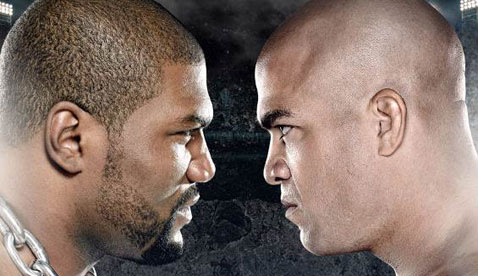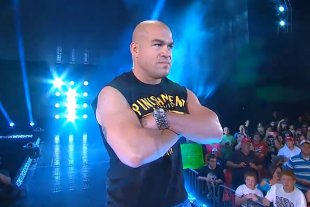Tito Ortiz and Quinton "Rampage" Jackson, two of the finest fighters in mixed martial arts history, will meet in the main event of a Bellator-promoted pay-per-view card on Nov. 2 in Long Beach, Calif.
It's not the kind of main event that would seem all that attractive to the discerning MMA fan. Ortiz and Jackson are a combined 0-6 in their last six fights, and are years past their prime. When he steps into the cage, Ortiz will have won one fight in the last six years and 10 months, a span in which he's gone 1-7-1. He hasn't won back-to-back fights since beating Ken Shamrock in July and October of 2006.
Jackson has fared marginally better, but is only 2-4 in his last six fights, and has increasingly looked as if he's at the finish line of his career.
The reaction to the announcement of the match amongst the fan base and the MMA media has not been good. Personally, I'm not outraged or upset. Confused, perhaps. Surprised, very.
But if Bellator wants to promote a pay-per-view fight card headlined by links to relics from the sport's past, it's up to Bjorn Rebney and Co. Rebney, Bellator's CEO, is the one who is risking a major financial loss, and he's the one who will have to cope with the embarrassment if the show is a colossal flop.
Ortiz and Jackson have slowed way down and lost many of the skills that once made them great. They can't stay healthy, which tends to happen to athletes as they age.
[Related: Has Bellator jumped the shark?]
But neither Ortiz nor Jackson seems at any greater risk than the average MMA fighter. There is risk for every fighter whenever he or she steps into the cage; the key is to manage the risk. That's why many state athletic commissions require stringent medical examinations to prove a fighter's fitness to compete.
The problem with the Ortiz-Jackson bout is that it will essentially happen in slow motion. Speed and quickness wasn't the hallmark of either man's game when they were in their primes, but near the end of their careers, their lack of those attributes will be accentuated.
It's a curious decision for Bellator, for a variety of reasons. Like it or not, the UFC is essentially the major league of MMA. Bellator has a number of quality fighters, and some who would be legitimate contenders or, perhaps, even champions in the UFC.
But in regards to top-to-bottom talent, there is no organization that can match the UFC. That relegates everyone else to second-tier status. That's what happened when the USFL came along and tried to compete with the NFL. It signed some players who were better than those in the NFL, but the NFL was the established brand and the USFL couldn't compete with it.
Bellator is owned by media giant Viacom, and has plenty of financial muscle, but the battle for major-league status in MMA has long since been settled.
By putting a pair of faded ex-UFC stars in the main event of its first pay-per-view show, and by filling their news release announcing the card with references to the UFC and its president, Dana White, Bellator is only reinforcing its second-tier status.
Bellator also looks petty by even putting on a pay-per-view show, because it is likely just a legal maneuver in its court case with top lightweight contender Eddie Alvarez. Alvarez attempted to sign a UFC contract, but Rebney contended Bellator matched the UFC offer and that Alvarez belongs to Bellator.
That's for a court to decide, but it's unconscionable for Bellator officials to tie up a young athlete in the prime of his career. But Bellator, which in the suit said it planned to feature Alvarez in a pay-per-view to compete against the UFC offer, now has to go forward.
When Rebney was doing a media tour prior to Bellator's launch on Spike TV in January, he emphasized Bellator's tournament model as superior to the UFC's matchmaking model. But making Ortiz-Jackson argues against what Rebney said.
On top of everything, pay-per-view is a difficult business. Bellator hasn't had great ratings on Spike, but it has at least been respectable. But having success on free TV and success on pay-per-view are two vastly different things. Pay-per-view is the most democratic of businesses. If fans like what they see, they buy it. If they don't, they save their money for another time.
The now-defunct Pride Fighting Championship always struggled to sell pay-per-view. In 2006, when it made its American debut by putting on Pride 32 at the Thomas & Mack Center in Las Vegas, it loaded the card.
Pride 32 was filled with stars in their prime – Fedor Emelianenko, Mauricio "Shogun" Rua, Josh Barnett, Dan Henderson, Vitor Belfort and Robbie Lawlor all fought on the card – and yet it barely broke 30,000 in pay-per-view sales.
In 2008, amid much media hype, Affliction put on a pay-per-view show that featured Emelianenko, Belfort, Barnett, Renato "Babalu" Sobral, Andrei Arlovski, Mike Pyle and others, and it struggled to reach 90,000 sales.
Pay-per-view success isn't determined by a sport's hardcore fans. It's determined by the casual fans, and even the non-fans, who may tune in because they catch wind of the pre-fight buzz.
It's going to be a tremendously difficult sell for Bellator. Even if Bellator fills the undercard with sensational matches, the vast majority of the public will not have heard of those fighters, and those bouts won't make an impact.
If the fight does any appreciable business, it's going to be because the public is curious to see Ortiz-Jackson. Having it in early November helps – most people can't afford to or just won't buy two pay-per-view shows in a month. But Ortiz-Jackson faces formidable pay-per-view opposition in November: UFC 167 features Georges St-Pierre against Johny Hendricks on Nov. 16, and boxing offers Manny Pacquiao against Brandon Rios on Nov. 23.
Every pay-per-view card is a calculated risk on the part of the promoter.
Rebney and Bellator are clearly taking a gamble. He's the guy who is going to have to convince you to spend your money on the 0-for-their-last-six Ortiz and Jackson, and not save it for St-Pierre-Hendricks or Pacquiao-Rios.
If he's wrong, he's the one who is going to pay for it.
Related coverage on Yahoo! Sports:• Dana White cutting it close with FS1 launch
• Hot or Not: Tito Ortiz, Nick Diaz and terrible tattoos
































